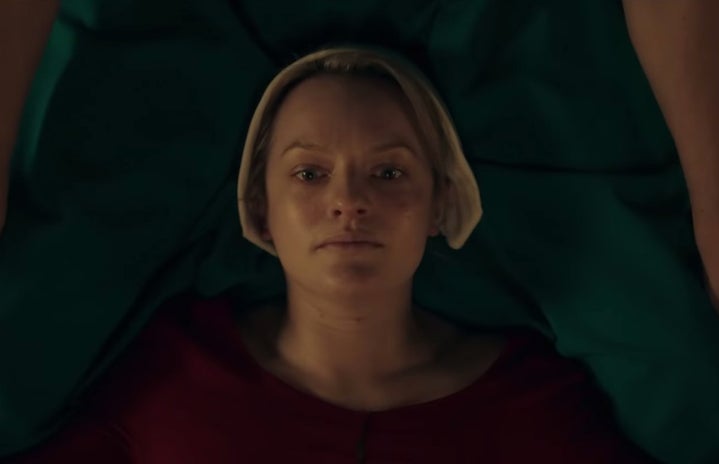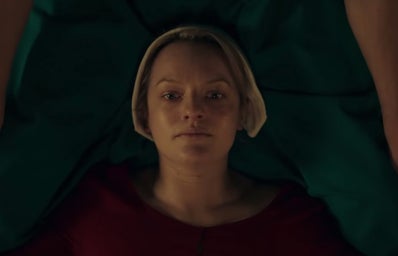Content Warning: physical abuse, sexual abuse, sexual assault, rape, violence, torture
Major Spoilers Ahead!!!
“The Handmaid’s Tale” by Margaret Atwood was a dystopian novel released in 1985 and was adapted into a Hulu original TV show in 2017. The show took the world by storm — with five seasons, millions of views, and 15 Emmys awarded to the cast and crew, it quickly became one of Hulu’s most successful TV shows. Even if you aren’t familiar with the show, I’m sure you’ve heard the many references people love to quote – “Under his eye,” “Blessed be the fruit,” or “Nolite te bastardes carbonundorum,” to name a few. With the current political and social unease in the United States, “The Handmaid’s Tale” is as relevant as ever.
synopsis
In this dystopian universe, the world is facing a global fertility crisis, where very few women are able to bear healthy children. The United States is taken over by a cult called the Sons of Jacob, and turned into a religious theocracy called Gilead. In Gilead, women who have “sinned” in the past are forced to become handmaids and bear children for the wealthy commanders and their wives. Once a month, the handmaids and commanders perform the “ceremony,” where the commander has sex with the handmaid while his wife holds her down. Handmaids do not keep their names, and are called “Of-(the commander they are assigned to).” If women are not handmaids, they are either Marthas (servants), wives, Aunts (older women who train handmaids), econowomen (members of poor working-class families), Jezebels (sex workers), or unwomen (women who have been banished to the colonies, areas of the country that have been ravaged by radioactive waste). Women in Gilead are highly oppressed and mistreated, to the point where they are not even allowed to read or write.
“The Handmaid’s Tale” is told from the perspective of June/Offred. She is a handmaid assigned to the home of Commander Fred Waterford after being stolen away from her husband and daughter. June is determined to survive the horrors she is going through and save her daughter. Season one of the TV show lines up with the plot of the book, and the other seasons continue the story beyond the book’s ending. In 2019, Atwood also released a sequel called “The Testaments” about June’s daughters.
Here is my opinion on the good and bad aspects of “The Handmaid’s Tale:”
the good:
- Incredible Acting
The acting in this show is phenomenal. Elisabeth Moss, who plays June/Offred, is obviously a talented actress, but the supporting characters have equally wonderful performances. The cast includes Ann Dowd, Joseph Fiennes, Samira Wiley, Sydney Sweeney, Alexis Bledel, Bradley Whitford, and many more talented actors. With a star-studded cast like that, it’s no surprise that so many of them won awards for their performances. The actors have made me forget that this show is fiction on several occasions, which is always a good sign in a TV show.
- Shocking Realism
This show is terrifying because it seems so possible. When writing the book, Atwood did not include anything in the book that had not already happened somewhere in the world, which means that all of the horrors we see have happened to real women. In the show, there are flashbacks to pre-Gilead times that look alarmingly like things do now, with mass protests, overt homophobia, and women being criticized for the choices they make. The most interesting thing about “The Handmaid’s Tale” is that it could happen, and this uncanny quality is part of what makes the show great.
- Morally Grey Characters
I love morally grey characters, characters that are not obviously good or evil, and “The Handmaid’s Tale” is full of them. The best example of this is Commander Joseph Lawrence. He helped create Gilead, enslaving millions of people, and holds very sexist views toward women. But he also never performs the “ceremony” with his handmaids and helps many of them to escape Gilead. I have spent literal hours pondering whether Lawrence is a good or bad character, and I still don’t have an answer. June also becomes somewhat of an anti-hero after escaping Gilead, when she assaults several people. The show does a great job of showing the effects of mass trauma on its characters, and how that blurs the lines for June’s character.
the bad:
- Excessive Violence
“The Handmaid’s Tale” has been accused of promoting “trauma porn,” or showing traumatic scenes in excess to obtain shock value, typically at the expense of Black people or other minoritized groups. I don’t have a problem with violence being shown in the show – the entire premise is that women are facing sexual violence because of the Christian theocracy of Gilead, so there will obviously be intense scenes. However, there are tasteful ways to show violence, and “The Handmaid’s Tale” crosses the line many times. Some of the punishments the women receive are simply unnecessary, and violence happens so often that it loses its emotional value.
- Euro-Centrism
“The Handmaid’s Tale” has characters of color (the show more so than the book), but the overall focus is still on the white characters. The things that happened to real-life women (that Atwood based the book on) are largely things that happened to women of color, poor women, and women from the Global South. We’re meant to be appalled at the horrible things these characters go through while ignoring that they are happening to real, non-white people today. I think the show tried to rectify this by making some of the main characters, like June’s husband, Black, but in my opinion, they have not done enough to show what women of color and poor women have gone through. To many marginalized groups, this isn’t fiction.
- Main Character Plot Armor
In the first two seasons, the realism is uncanny. It’s terrifying to see just how possible these events could be. But the more laws that June breaks without consequence, the more unrealistic the show feels. Gilead has incredibly strict rules, and most lawbreaking ends in death. June, however, continues to run away, hurt and kill commanders, and even send over 80 children out of Gilead to Canada. Any one of these events should have resulted in her death, especially when she “stole” children from Gilead. June’s main-character armor always keeps her safe, and I wish there was more of an explanation as to why she doesn’t face consequences. I’m definitely not saying I want June to die, but her continued success reveals lots of plot holes.
so, should you watch “the handmaid’s tale?”
Yes and no. I think this show, particularly the first two seasons, is phenomenal and extremely relevant to modern society. The show is both entertaining and eye-opening. However, I cannot stress this enough: DO NOT binge-watch this show. It is extremely difficult to watch women being physically and sexually abused for hours at a time, so I do not recommend doing that. I would suggest going for a walk or doing something else calming after watching so that you can process what you just saw in a healthy way.
If you are impacted by violence or sexual assault, I do not recommend watching this show at all – as you can tell from the non-exhaustive content warning at the beginning of this article, this show contains just about every trigger imaginable. The book, while still including violence, is far less graphic, which would make it a much better option.
Overall, I think “The Handmaid’s Tale” is a great show, but you should definitely do your own research before deciding to watch. Know your limits, and step away from the show if you need to. There are plenty of other ways to learn about the show’s messages through the book and many articles and reviews that have been written about it.
This show has given me so much to think about and has increased my awareness of injustice in the real world. I, for one, am anxiously awaiting an announcement about season five any day now!


